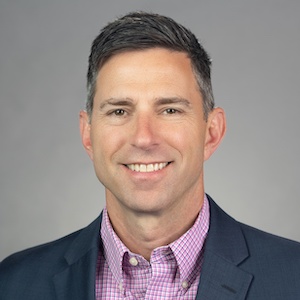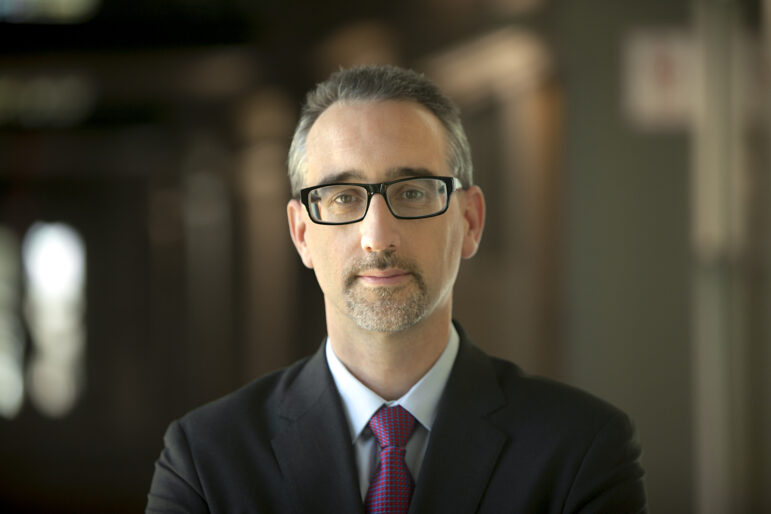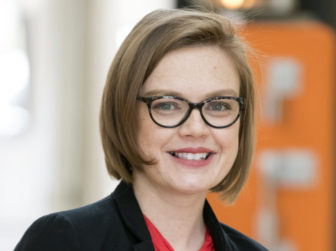Public media considers next steps to position itself for major news funding

peshkov / iStock
Public media is planning how it might benefit from an upcoming $500 million infusion of support for local news as it awaits next steps from Press Forward, the coalition of funders overseeing the ambitious effort.
Twenty-two donors nationwide signed on as partners for the initiative, spearheaded by the MacArthur Foundation with the goal of strengthening local newsrooms and the infrastructure supporting them.
“We are prepared to support the strongest ideas and seed new ones; build powerful networks; and invest in people, organizations, and networks with substantial resources,” said MacArthur President John Palfrey in a Sept. 7 announcement.
Distribution of the grants will begin next year. Press Forward plans to release grantmaking guidelines in early 2024.
That leaves public media considering next moves while facing an uncertain process. Last month, NPR joined public media stations and organizations in publishing a position paper, “Public Media and the Future of Local Journalism.” The paper aimed to help funders understand the complexities of public media and to foster collaboration among system leaders while also serving as a jumping-off point for stations to use in messaging to funders.
The paper’s authors highlighted the industry’s investments in local news and how additional support could help stations grow into “anchor institutions—hubs that support and connect a diverse array of news providers and hyper-local creators.”
“This is not the moment to rest on our laurels,” said Public Media Co. CEO Tim Isgitt, who assisted with the position paper and helped produce “The Roadmap for Local News,” a report released in February that recommended that “a coalition of media practitioners, pro-democracy advocates, funders, and government leaders join forces to ensure that civic information is a ubiquitous asset in every community in the United States.”

Isgitt said that as he worked on that report, he thought, “Gosh, a solution to local news ought to be this amazing public media system that has been developed over the last 50 years.”
The position paper created by NPR and stations is a “tremendous first start,” Isgitt said. But he added that stations “need to connect the goals of the Press Forward funders with how … we actually accomplish the revitalization of local news and local ecosystems around the country.”
“If you think of public media stations as a potential solution, how do we make that happen?” he said. “I don’t think anybody’s connected the dots clearly yet. I think the position paper is a great first step in that.”
‘Motivation’ for collaboration
NPR CDO Leora Hanser, who led publication of the paper, said she didn’t want to let the Press Forward opportunity go by “without us at least putting a stake in the ground for what it is that we do well.”

Funders harbor misconceptions that “public media is very well funded, that we might not be as needy as other organizations,” Hanser said. In addition, they sometimes lack a “complete understanding of how much original reporting our stations do.”
The paper received feedback along the way from more than 100 public media leaders and had 125 signatories, she said.
“We are super excited about the opportunity that Press Forward has presented,” Hanser said. “I think it has motivated many stations to want to work together in a way that may not necessarily have been front of mind beforehand.”
Now that the “heavy lift” of collaborating on the position paper is behind her, Hanser said it’s too early to determine how NPR will approach applying for funds. She said she’s sure that NPR will submit a proposal, though its shape is yet to be determined. It is likely to be developed in tandem with stations and may focus on collaborative journalism or a similar initiative, she said.
Hanser hopes that as many stations as possible will apply. “I know that some stations already have proposals that they’re working on … and that’s great,” she said.
“This is about local journalism,” Hanser said. “So I think … there will be a role for NPR, but I think it’s going to be very distinct from what local stations are going to be applying for.”
During a webinar Tuesday, Hanser will offer station fundraisers advice on applying for Press Forward funds. She will also introduce the Collaborative Philanthropy Advisory Council, a group of system fundraisers formed over the summer as a resource for their peers.
The group is “working to advance ideas that grow the donor pipeline and expand support to all of public media,” Hanser said in an email. “Our hope is that this group will strengthen NPR’s partnerships with fundraising staff at Member Stations and expand collaboration in the fundraising space networkwide.”
An ‘obligation’ for stations
Nico Leone, CEO of KERA in Dallas, said he believes public media will respond to Press Forward with a mix of approaches: stations applying individually, groups of stations applying, and possibly “a larger proposal from NPR and stations together, but we just don’t know yet,” he said.

“What we do know is that there’s a great opportunity for either individual stations or groups of stations around the country to bring proposals forward and really articulate the way they’re serving their local communities, collaborating with other newsrooms locally to deepen and broaden services to our audiences at a really critical moment,” said Leone, who assisted with developing the position paper.
Leone said he believes stations should talk to local foundations about Press Forward “and the opportunity to bring funds in to support our work locally,” he said. “Every station has an obligation to ask the question, ‘How can we best approach this opportunity? Who are the right partners to approach this with collaboratively?’” Leone said.
The position paper can aid conversations with funders because it helps coordinate the system’s message, he said.
“To the extent that we’re all telling a similar story and telling our version of that story, I think we’ll all be stronger,” Leone said. The paper has also “helped make sure that folks at stations across the country are focused on the opportunity and are thinking about how to access it,” he said.
Public media can be “a little hard to wrap your head around,” Leone said, and “we often struggle to tell our own story.” But he sees the position paper as a “good step forward” in telling the story of how stations throughout the country are impacting their communities.
The paper is also helpful as a “starting point for us to say ‘We are here and we’re doing this work that you’re talking about,’” which hasn’t always been the case, said Rachel Hubbard, executive director of KOSU in Stillwater, Okla.
Public media was “largely absent” from early conversations about Press Forward, said Hubbard, who also helped work on the position paper. At the Institute for Nonprofit News’ INN Days conference in June, funders discussed the early framework of what became Press Forward. Hubbard noticed that only a few other public media leaders were present.

“That was very concerning to me,” she said. “There were a handful of us there, but to a large degree we were unrepresented in those conversations, and not because we weren’t invited. We just didn’t show up.”
She believes public media leaders need to be more “intentional about being present in spaces” outside of their own industry’s conferences and events.
“We still view ourselves as these little underdogs that are over here and we just keep to ourselves,” she said. “Meanwhile, this entire new ecosystem has grown up around us, and we haven’t shown up.”
Going forward, it will be important to make a case for supporting public media as a whole, Hubbard said, because funders may base their perceptions of public media on their local stations.
“If their local public media station is not one of the outlets that either has the bandwidth or the funding or the wherewithal to step in and start trying to figure out how to be a frontline news provider, then they may be like, ‘Yeah, these people are asleep at the wheel,’” she said.
Possible headwinds
Many public media organizations are well-positioned to access Press Forward’s funding, in part because they have relationships with local funders, said Vincent Stehle, executive director of Media Impact Funders, a membership organization that works with funders that support public-interest media.
“So I think they don’t have to look at this as a brand-new challenge,” Stehle said.
Philanthropic support for local news and nonprofit news is growing, he said, but more organizations are seeking funding and public media organizations could face headwinds when applying.
“It’s fair to say that there’s a lot of excellence in the field” of public media, Stehle said. “There’s a lot of innovation in the field. And there’s also a lot of conservative, perhaps timid and routine behavior in the field, too.”
“There’s a sense that too many public media stations rest on the laurels of a very strong national brand and aren’t really pushing themselves to create distinct, robust, truly local news capacity for their communities,” he said. “… Everyone should ask themselves if they’re doing the best they can in serving the local community needs, the information needs, and not just being … a repeater signal for a national broadcast.”





